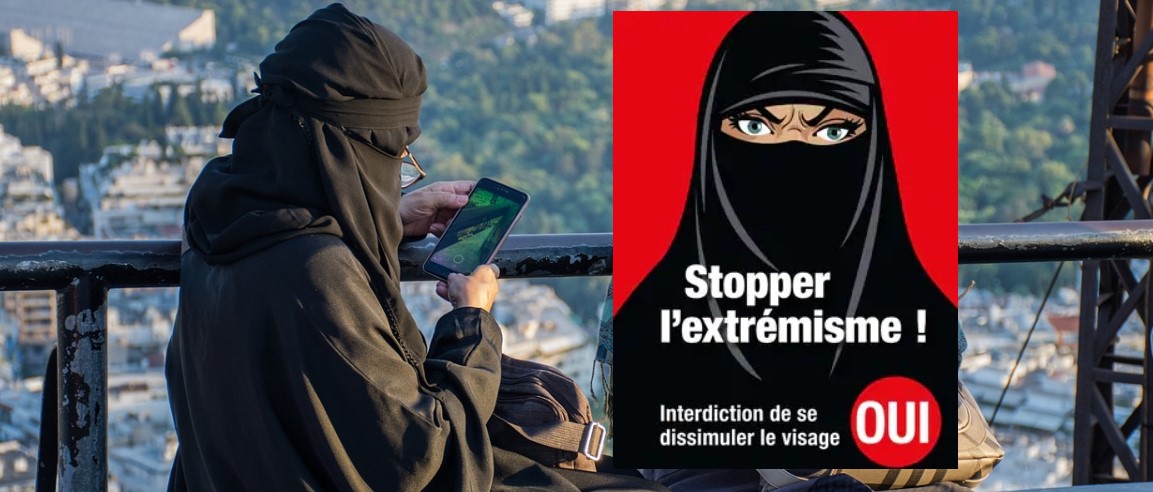The Islamic full-face veil will soon be banned in Switzerland, as is the case in France, Bulgaria, Austria and The Netherlands. The question was the subject of a vote organized on Sunday March 7, in Switzerland. According to information from BFM TV, the text was carried by the Democratic Union Centre party (UDC).
It is clearly a much less centrist party than its name suggests, since it is frequently classified as right-wing or far-right. The ballot, which has provoked very important debates in recent days, was announced particularly tight. The Swiss political scientist Claude Longchamps even estimated that the “no” to the ban would prevail, by a small margin. At the beginning of the afternoon, on Sunday, it was finally the opposite which occurred. According to RTBF, more than 52 percent of the Swiss had voted in favor of the ban.
Posters from those parties against the ban read: “No to an absurd, useless and Islamophobic ‘anti-burqa’ law.” A 2019 Federal Statistical Office survey in Switzerland revealed that 5,5 percent of the Swiss population were Muslims, mostly from Bosnia. Ines El-Shikh, spokeswoman for a Muslim women’s group, told news agency AFP: “Besides being useless, this text [for the proposal] is racist and sexist.” The leader of the Green party echoed her sentiments, saying it would only add fuel to the fire.
As often elsewhere in Europe, the vote did not explicitly concern the Islamic full veil. Swiss citizens were in fact called upon to vote on the ban on concealing one’s face in public spaces. It is very frequently used pretext to ban the full veil, without specifically targeting Muslims.
Jean-Luc Ador, spokesperson for the Swiss People’s Party (SVP) and the “yes” campaign, also said that Muslims were not “the target of the initiative”. The political leader simply intended “to defend the values of our civilization”. However, in its communication, the SVP made no secret of the real objective of the ballot. The posters showed fully veiled women, crossed out with slogans: “Stop radical Islamism” and “stop extremism”.
The government had claimed that the number of women who wear the burka in Switzerland is between 95 and 130, suggesting that it was not really necessary to institute a ban for such a small number of people. But Ardor responded in an interview with SWI: “I would be curious to know on what basis the government is making these estimations.”
According to initial projections, the Swiss wanted a nationwide ban on full-face veils in the referendum, according to the Basler Zeitung.
This dress code will be incorporated into the constitution and will apply on the streets, in restaurants and shops. There is an exception for religious meeting rooms however. Such a ban already existed in the Swiss cantons of St. Gallen and Ticino.
According to the SRF extrapolation, the turnout had been around 51 percent. In 2009, 57,5 percent of the population had already joined the popular initiative “Against the building of minarets”. Both these votes were initiated by the Egerking Committee, which, according to its own statements, organizes “resistance against the claims to power of political Islam in Switzerland”.
With Switzerland’s system of direct democracy, a national vote can take place on any issue as long as it gathers 100 000 signatures from its 8,6 million inhabitants. To prevail, these initiatives require support from a majority of voters nationwide, and from a majority of federal Switzerland’s 26 cantons, six of which count as half-cantons in votes.













One comment
The Swiss leftists who joined the Muslims settled in Switzerland tooppose the burqa ban touted the term ‘Islamophobia’ quite freely in attacking those voting for the restriction. The term ‘Islamophobia’ is quite a ridiculous label for anyone to use, however. Those using it apparently don’t know much about its origins, which were in the 1990s USA. It was coined by the people who founded CAIR, and was designed as an attack word against anyone who questioned the growing presence and influence of Islam and Muslim activism in Western countries .It’s unfortunate that those who uncritically continue to use the term are not called out for being clueless dupes of the Muslims, and subscribing to their agenda in doing so.
At any rate, the ban was voted and will soon become effective. The Muslims complain now about the Swiss public and the advocates of restrictions ‘opening old wounds’. Really? To what are they referring? What the Swiss are doing is restoring commonsense internal security and restrictions that help deter uncontrolled political and social extremism and division. If that causes grief among certain people who find modern Western society a difficult thing to live with, they such critics might want to consider moving to somewhere that still allows the prevalence of religious or cultic legislation they find acceptable.
By submitting a comment you grant Free West Media a perpetual license to reproduce your words and name/web site in attribution. Inappropriate and irrelevant comments will be removed at an admin’s discretion. Your email is used for verification purposes only, it will never be shared.